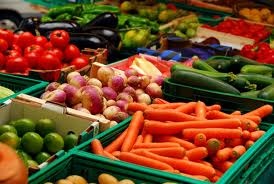A large chunk of vegetables on the open markets is reported to be highly chemical-contaminated due to the misapplication of agrochemicals during production, B&FT has been told.
The reports of contamination compiled by the B&FT, on a visit to a number of famous vegetable producing areas and markets in the middle-belt of the country, show that some vegetable farmers and traders deliberately apply chemicals to the produce in a bid to make them attractive to consumers.
The practice, though anecdotal, is widespread among predominantly vegetable farming communities in the country amidst admission by policymakers that food safety is a major issue in the country, and the lack of it is believed to be mostly behind the many diarrhoea cases the country witnessed.
The Food and Drugs Authority has noted that a major challenge for the food sector in Ghana is the fac that the sector is dominated by small-scale or cottage industries which lack the requisite technology and know-how.
According to some farmers and traders the B&FT talked to, consumers’ soaring preference and demand for attractive vegetables such as tomatoes, garden-eggs, pepper, cabbage and lettuce has compelled many of them to excessively use and misapply agrochemicals to meet the standards of buyers.
Information available to B&FT indicates that some farmers spray insecticides on vegetables in the morning and harvest in the evening on that same day, and this is contrary to post-harvest interval timelines of all the insecticides -- ranging from a minimum of three days to two weeks.
Madam Akosua Kyeremaa, a tomato middle-woman dealer, told the B&FT: “I am very particular about the attractiveness of the produce I buy for my customers. It is one of the basic qualities I look out for when buying from farmers”.
When asked if she was aware that most farmers wrongly apply chemicals to meet such set quality standard, she responded: “I don’t have the technical know-how to examine the chemical content of tomatoes. But I hope the farmers will do the right thing to save us all”.
The B&FT has gathered that many farmers who were into traditional methods of farming such as the use of organic fertilisers derived from animal matter, human excreta or vegetable matter for cultivation have all drifted into the new unhealthy mode of farming, whereby farmers abuse inorganic fertilisers and other chemical inputs.
Though they admit the practice is erroneous and dangerous to the health of vegetable consumers, they have no choice than to join the practice of other farmers to make themselves relevant in business. They said produce from organic fertilisers are unattractive and do not sell at the markets, thus they embrace the new harmful trend of farming.
An Akomadan-based tomato farmer, Kwebena Duodu, in an interview with B&FT said he had tried organic fertilisers but ran at a loss as buyers were shying away from his produce -- and he had to reduce the price drastically to dispose of them.
He pointed out that aside from the rich health benefits of organic fertiliser produce, it is environmentally-friendly and relatively cheaper than chemicals. He was quick to add that buyers’ apathy toward its products has however discouraged vegetable farmers’ interest in using them.
Mr. Duodu noted that many farmers are ignorant about the appropriate methods of using agrochemicals. He therefore appealed to the involved stakeholders to intensify public education on the use of agro/farming inputs to promote safe farming practices in order to reduce the alarming rate of abuse in the system.
Business News of Wednesday, 13 May 2015
Source: B&FT
Contaminated vegetables flood markets













